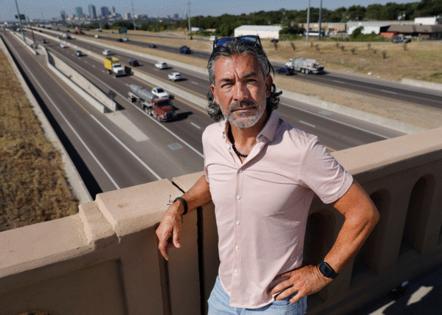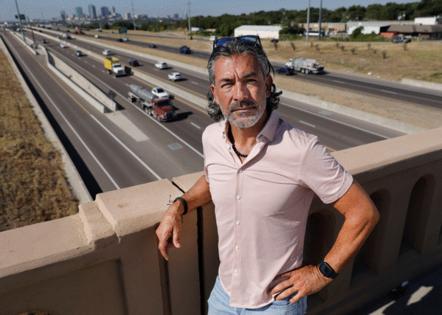Texas House initially approves redistricted congressional map favoring Republicans
Published in News & Features
Texas House lawmakers on Wednesday gave initial approval to a new congressional map that positions Republicans to pick up five seats in Congress — a vote that comes after vocal opposition from Democratic members, many of whom left the state to try and block the measure.
The majority of the quorum-breaking Democrats returned Monday, vowing to move their fight to the House floor after the first special session ended early and California and other blue states consider reformatting their maps to favor Democrats. As they returned to Austin, House Democrats said they’d shift their focus to building a legal case against the map to show that its unconstitutional and violates the Voting Rights Act, a landmark voter protection law.
The map was approved 88-52. A second vote expected Wednesday before the map heads to the Senate for consideration.
At points during the hours-long debate, cheers from a rally gathered in the Capitol rotunda outside the House chamber could be heard.
Attendees opposing the mid-decade redistricting plan held a large banner reading “Put Texans First.” Another banner urged lawmakers to “End Gerrymandering, Save Democracy.” A “Let her out” sign seemed to refer to Rep. Nicole Collier, a Democrat from Fort Worth who has been confined to the Texas Capitol after refusing to sign a “permission slip” requiring Texas Department of Public Safety supervision to leave.
Meanwhile, Democratic lawmakers were presenting a series of ultimately unsuccessful amendments that proposed things like tying the map to the formation of an independent redistricting commission or requiring the use of current congressional boundaries if the new lines are held up in court.
Rep. Todd Hunter, a Corpus Christi Republican who proposed the map approved Wednesday, said map was drawn to advantage Republicans in elections. President Donald Trump has called on Texas to pick up five congressional seats, and Democrats have blasted the map proposal as a power grab that would disenfranchise Black and Hispanic voters.
“Mr. Speaker and members, according to the U.S. Supreme Court, you can use political performance, and that is what we’ve done,” Hunter said.
He said nearly all of Texas’ 38 congressional districts change to some degree, but the primary alterations were focused on five congressional districts for partisan purposes: Congressional districts 9 in the Houston area, 32 in North Texas, 35 in Central Texas and districts 28 and 34 in South Texas. It also aims to improve Republican performance in several other districts, Hunter said.
The map moves Congressional District 33 held by Democrat Marc Veasey, which currently spans parts of Dallas and Tarrant counties, and moves it fully into Dallas County. Most of what was the Tarrant County portion of the district would primarily be divided between Congressional District 12, represented by Fort Worth Republican Craig Goldman, and Congressional District 25, represented by Willow Park Republican Roger Williams.
Through their questions on the floor and in closing comments, Democrats raised concerns about a lack of opportunities for public feedback on the map. The latest version passed through a House committee earlier this week without public testimony. In the first special session, the House held three general hearings on redistricting, including one in Arlington, as well as a hearing on a proposed map.
They also pushed back against the mid-decade timing and a lack of new census data. Hunter emphasized that redistricting can be done at any point in time. Mid-decade redistricting is uncommon but not unprecedented in Texas.
Rep. Chris Turner, a Grand Prairie Democrat, filed an amendment to block the bill from taking effect, but the idea was voted down 87-50.
He argued that the redistricting is racially discriminatory and would allow politicians in Washington to pick their voters, rather than voters picking their representative. During closing remarks on the bill, Turner addressed Tarrant County and other parts of North Texas in depth.
The map “cracks heavily Black and Hispanic neighborhoods in Fort Worth out of Congressional District 33, the district they have been united in since 2012,” Turner said. He also said economic engines would be moved out of Congressional District 30.
“You can falsely claim it’s about partisanship, but you know that’s just a smoke screen for racial discrimination,” Turner said. “We all see it. The people of Texas see it, and now the American people see it.”
The map is a “gross attempt to make Texans give up. To believe that their vote doesn’t matter because the outcome is predetermined,” said Rep. Ramon Romero, Jr., a Fort Worth Democrat who chairs the Mexican American Legislative Caucus.
“That’s not democracy,” Romero said. “That’s dangerous.” Democrats gathered behind the front mic of the House chamber as members of their party took turns with their closing statements. They exchanged spots with Republicans as Hunter took the podium to give his final comments.
“Now we have just heard a couple of hours from our Democrat opposition, and everyone that spoke was with the Democrat Party,” Hunter said. “I’m standing with Republican members, and what’s wrong with Republicans standing up and Republicans stepping up and Republicans being honest, which you don’t like, which is, Supreme Court says we can use political and partisanship to do congressional redistricting.”
Tensions between Republicans and Democrats who broke quorum was apparent at points throughout the floor debate.
During a heated exchange with Hunter, Rep. Barbara Gervin-Hawkins, a San Antonio Democrat who chairs the Texas Legislative Black Caucus, said the caucus wasn’t engaged in the map configuration process.
“So for 17 to 18 days you left,” Hunter said. “Now, you’re getting on the microphone saying why didn’t I involve you? Well, I wasn’t going to cross state lines to find you. I was here.”
Gervin-Hawkins addressed the exchange in her closing remarks on the bill.
House Democrats didn’t run from anything, she said.
“We ran to the public because of what we felt has truly been an injustice and is being an injustice,” Gervin-Hawkins said.
As he was closing, Hunter said comments he heard from Democrats during the floor debate could have been addressed while Democrats were away breaking quorum.
Collier responded, questioning from the floor’s back microphone.
“Are you aware that when there was slavery times, Blacks fled?” she said. “During the Nazi times, Jewish people fled. They fled their oppressor.”
_____
©2025 Fort Worth Star-Telegram. Visit star-telegram.com. Distributed by Tribune Content Agency, LLC.










Comments